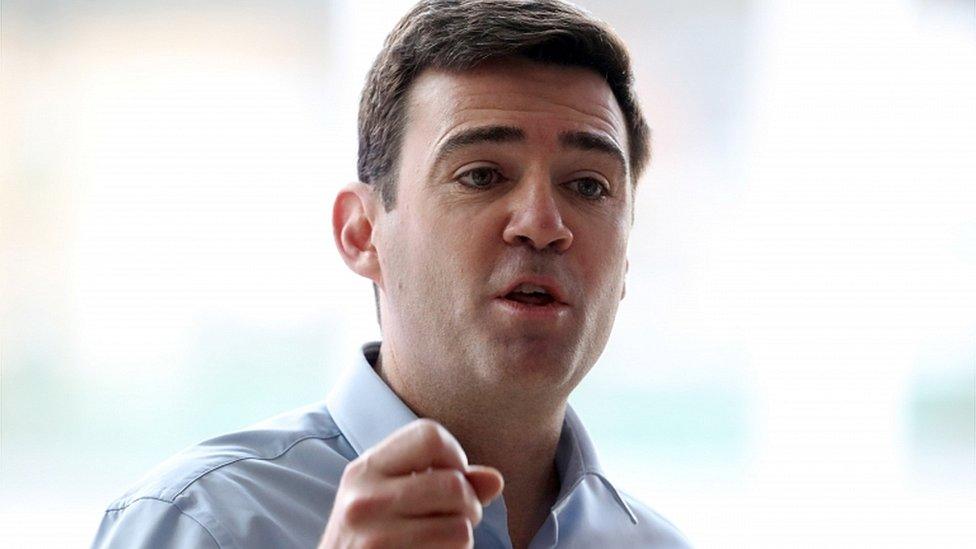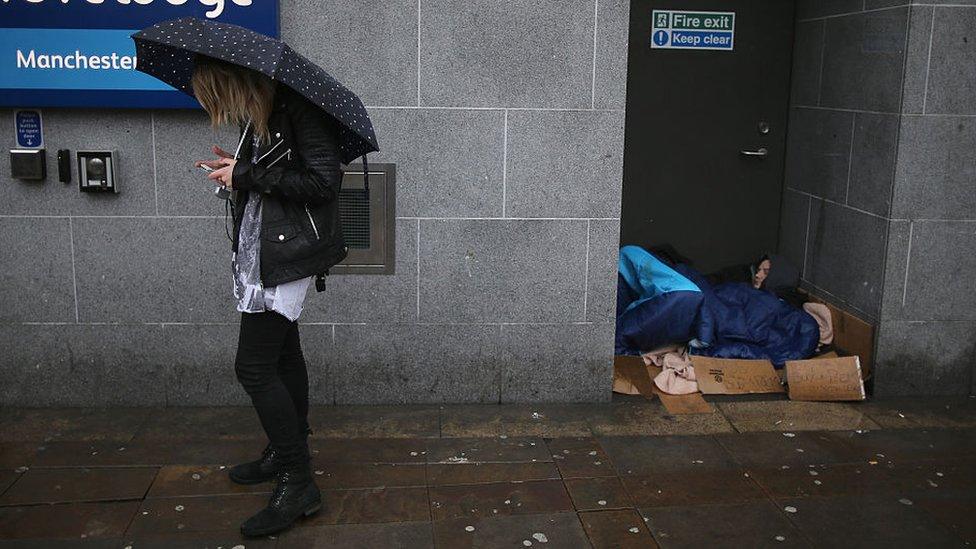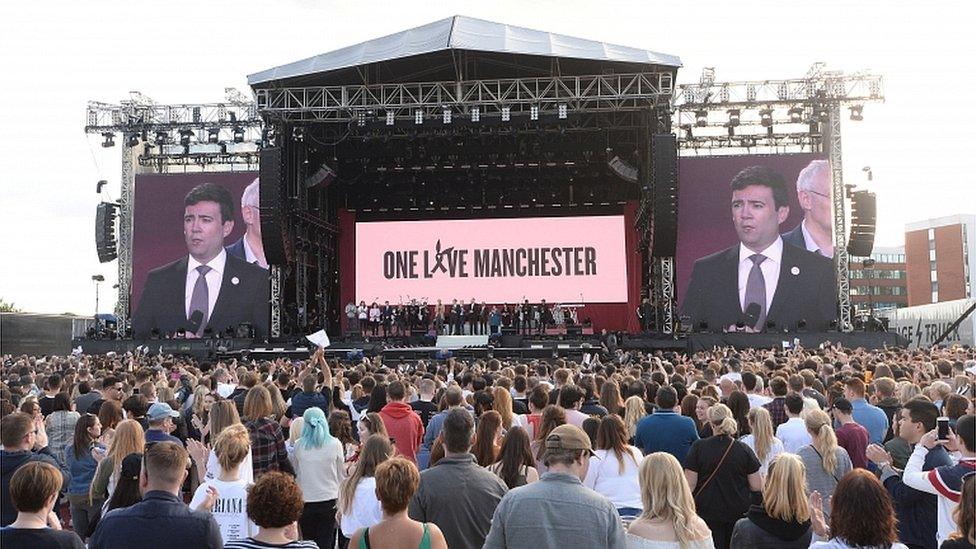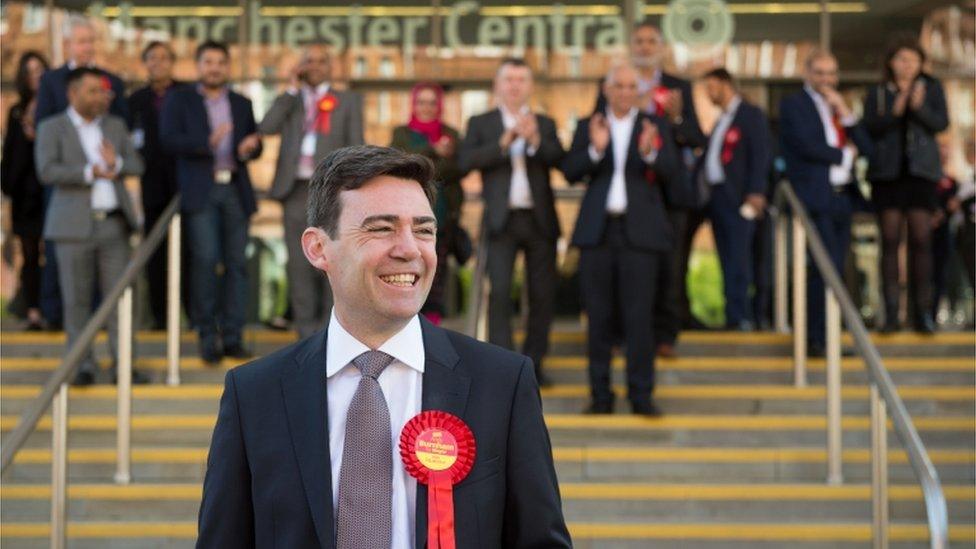Andy Burnham: Becoming Greater Manchester mayor was 'the right move'
- Published

Andy Burnham's inaugural address promised the "dawn of a new era" in Greater Manchester
One hundred days into the job, there is one thing Andy Burnham is sure of - a metro mayor can have more impact on the North than an MP.
"I am totally convinced it is the right move. I was frustrated with Westminster and its London-centric, dysfunctional thinking," he says.
"If they can ignore us, they do."
But is it not better to change a system from within, rather than give up on Parliament?
"I tried. I really did, but I decided it wasn't where I can make a difference," he replies.
"Here I can. One hundred days in, I feel that even stronger."
There is no doubt he believes in the potential of devolution and the metropolitan mayoral system.
His inaugural address promised the "dawn of a new era, giving power and purpose to the voice of the North".
'Do things our way'
Since then, Brexit Secretary David Davis has failed to keep a promise to meet the metro mayors, while Transport Secretary Chris Grayling called him a "mischief maker" after he pitched into the row about the approval of London's Crossrail 2 after electrification in the North was cancelled.
He says that is frustrating but "I will continue to be a voice for the North".
He has also had to deal with claims of a rift with Labour - not least because he appeared to refuse to meet leader Jeremy Corbyn on the day he became mayor.
He says that has been wrongly portrayed and there is no pulling away from Labour.
"I told Jeremy it wasn't possible to meet him that day," he says.
"It's frustrating, because we worked together on the general election.
"It was me who told him to engage young people and it worked - for him and for me."

Mr Burnham has pledged to end homelessness in Manchester by 2020
Since becoming mayor though, he says he and his team have tried to "do things our way".
Later in August, he will meet business leaders in Leeds to strategise about how to make HS3 a reality.
He has also kickstarted a homelessness fund by donating 15% of his salary, with the aim of eradicating homelessness in Manchester by 2020.
However, he recognises that is a massive challenge.
"Over the past 100 days, homelessness has got worse, not better - but I refuse to revise the date.
"By 2020, every person in Manchester should have a roof over their heads."
He says to succeed, there is a need to use "bottom-up politics, where we raise money voluntarily [and] involve the volunteers".
He admits that does not sit comfortably with his Labour principles, but adds: "Is it right to leave people out on the cold streets? There is more we can and should do."
Professor Jon Tonge, an expert in the region's politics, says "in terms of agenda setting, it's nine or even 10 out of 10" for Mr Burnham.
"He had given up a lot coming from Westminster, [but] even his biggest critics will acknowledge he has made a big commitment in becoming mayor," he says.
For Bolton West's Conservative MP Chris Green though, the mayor's preoccupation with the North-South divide is an issue.
"If the only comments someone has that cut through are negative, then that does the area down," he says.
"It damages people's desire to invest in the North West and Greater Manchester.
"We need the mayor to be promoting first and foremost."
'Set the tone'
The mayor's first 100 days have not all been about proaction, as he also had to react to the Manchester Arena attack.
He had been mayor for just two weeks and was playing five-a-side on 22 May when Salman Abedi detonated a bomb outside an Ariana Grande gig at the venue.
Shortly after, Greater Manchester's chief constable called and confirmed it was a suicide attack.
"I will never ever forget that conversation - I stayed up all night, shocked to the core, and thought, 'where do we go from here?'" he says.

The mayor spoke at the One Love Manchester benefit show in the aftermath of the arena attack
In the aftermath, he was the first public figure to address Greater Manchester's population.
It was a presidential moment which he pitched well, as he paid tribute to the city's spirit of unity and flatly refused to point the finger at Muslims.
He says he has been "taken aback by the incredible warmth and strength of our people".
"We have a unique spirit."
For Prof Tonge, the mayor's response "set the tone" of what came next.
"Many people copied his words and there wasn't the backlash that some people feared.
"Frankly, the city displayed great tolerance and Andy can take some of the credit for that."
Those are pleasing words, but in many ways, the first 100 days are the easiest.
The mayor has done well, but as Prof Tonge puts it, "we will have to wait a few years before he can be measured on his success".
- Published5 May 2017
